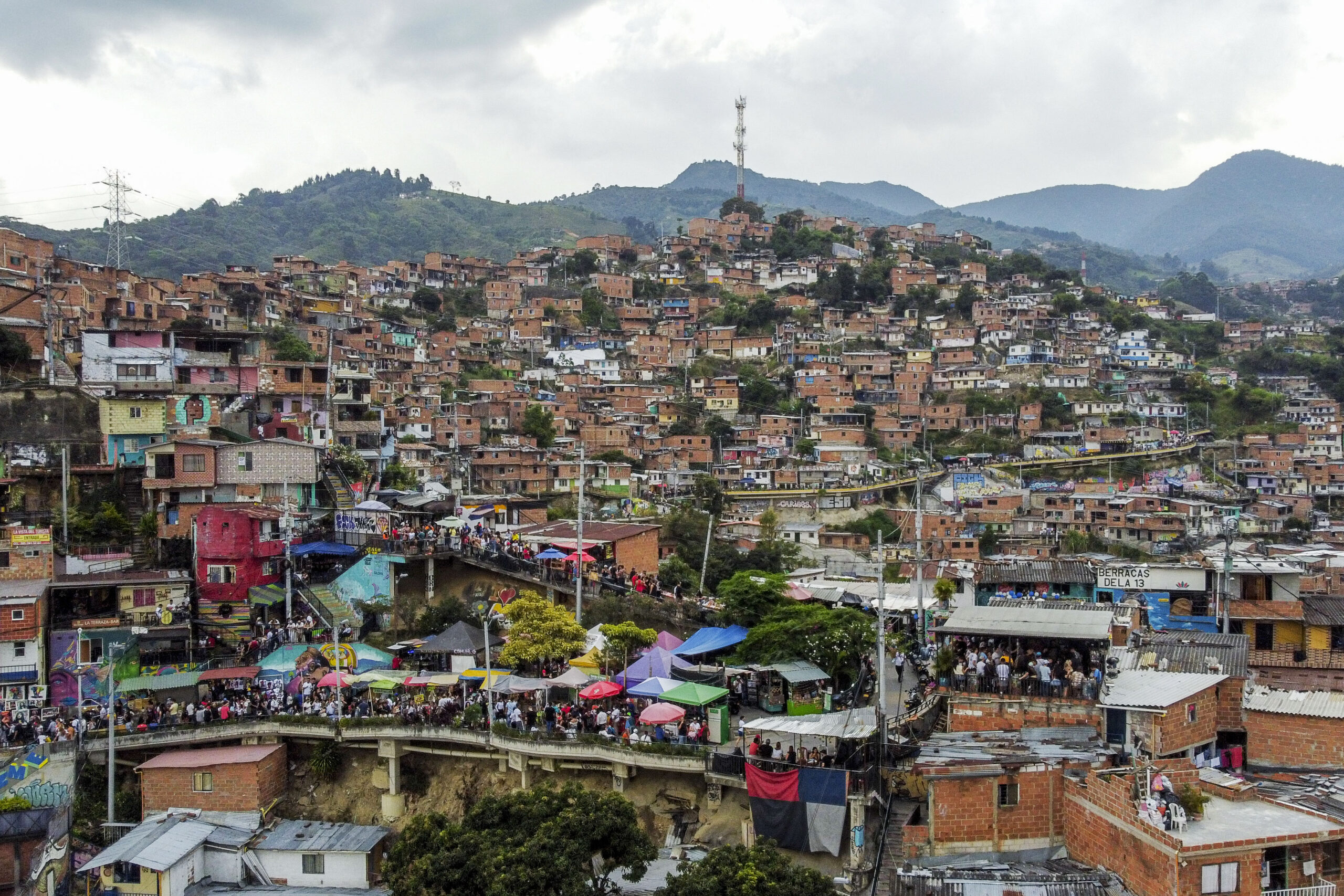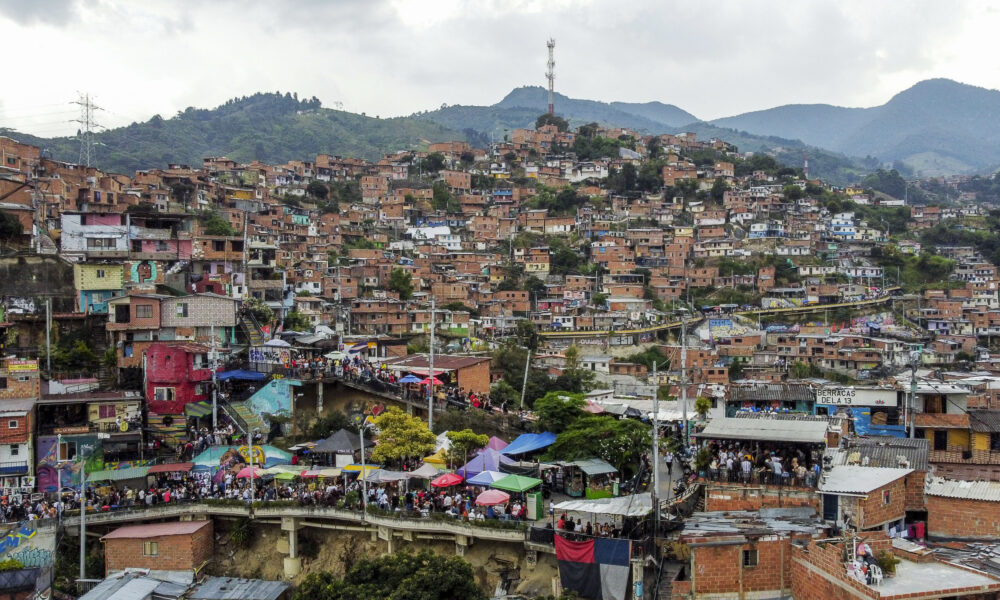International
Murder rate plummets amid ‘gangster peace’ in Medellin

| By AFP | Hervé Bar |
Seven days without a single murder… The month of August marked a security record for Colombia’s second city Medellin, the onetime fiefdom of infamous drug lord Pablo Escobar.
“In Medellin, security is measured in lives” saved, said Mayor Daniel Quintero as he welcomed the breakthrough.
Medellin has seen a vertiginous drop in homicides by 97 percent in the 30 years since Escobar’s death, transforming what used to be one of the most violent cities in the world into a popular tourist destination.
The success is attributed in large part to an unofficial but mutually beneficial understanding between narco gangs, paramilitaries and the security services.
“Peace is good for business,” explained Medellin drug dealer “Joaquin” (not his real name) of the traffickers’ motivation for avoiding violence.
Joaquin is 37 years old — two of those spent behind bars. He wears an oversized baseball cap and sagging jeans.
A Beretta pistol peaks out from under his hoodie.
Joaquin is a “capo,” a junior boss supervising drug trafficking in the streets of “Comuna 6,” a poor neighborhood perched on a mountain slope in Medellin’s northwest.
He belongs to a gang, which he declined to name, that follows the rules imposed by an organized crime “federation” known as the “Oficina de Envigado” or the “Office of Envigado” after the name of a nearby town.
Joaquin claimed the Oficina and its member gangs acted “in solidarity with the community.”
This included meting out “parallel justice” when the system fails them.
“Escobar? He was much too violent. Too many deaths for nothing,” Joaquin told AFP.
‘The population with us’
“Everyone lives in peace on our territory,” said the capo, keen to portray himself as a good Samaritan.
“We do not want to frighten the traders and the people. We need the population with us.”
Thirty years after Escobar was shot dead on a Medellin rooftop while trying to evade capture, the drug trade still dominates many poor neighborhoods of the city of nearly three million people.
A stone’s throw from a football pitch where mothers watch their children play, heavy foot traffic at a small, nondescript house indicates the presence of a drug den.
A black garbage bag covers the window where money trades hands. The purchased merchandise drops down from another floor in a tin can on the end of a string.
A variety of product can be found here: marijuana, cocaine and “tucibi” or “basuco” — two cheap and particularly toxic new drugs akin to unrefined “crack.”
“Everything is organized, it’s like a business. There are those who take care of the sale, the logistics, the soldiers. The bosses pay our salaries, we do the job,” said Joaquin.
He and his colleagues move with incredible ease and assurance through the maze of sloping alleys and small, rickety brick houses. Neighborhood teenagers skulk around, acting as security.
Joaquin and his accomplices pop into one shop after another, shaking hands with acquaintances everywhere while they casually slip a gun into a bag here, deliver a package there.
For the most part, Medellin’s dealers are able to operate in peace due to an understanding among rival gangs as well as with members of the security forces — many of them on the take.
As long as they keep the streets peaceful, the gangs say police turn a blind eye to their lucrative illegal dealings.
Joaquin calls it a “gangster peace.”
“There is nothing better than peace,” added “Javier,” an associate who met up with Joaquin and another colleague in a squatted house.
They pack out their guns on a table between religious trinkets in a filthy, lightless living room where horse posters vie with a crude rendition of the Last Supper on the wall.
“Every group manages its territory as it wishes… The bosses talk among themselves. Everything is arranged calmly,” said Javier.
– ‘City of bandits’ –
After Escobar’s demise, the face of organized crime in Medellin changed. Long controlled by a single cartel, the drug trade is now shared between several gangs under the umbrella of the Office.
The gangs had previously collaborated with paramilitary groups and the security forces to help bring an end to Escobar’s Medellin Cartel and oust leftist guerrilla groups that had tried to fill the power void it left.
As things settled down and every group found its place in the new reality, Medellin’s homicide rate dropped from 350 per 100,000 inhabitants in 1992 to 10.2 per 100,000 so far this year — nearly half the national average.
“The armed groups set the peace and war agenda in the city,” said Luis Fernando Quijano, director of the Corporation for Peace and Social Development, an NGO.
Colombia’s new leftist president, Gustavo Petro, has vowed to bring “total peace” to conflict- and crime-ridden Colombia, including by offering an amnesty to gangsters willing to give themselves up and abandon the trade.
“We are willing to listen. We will do what the bosses decide,” Pedro said of the plan.
But for Joaquin, “to think that everyone will give themselves up is a dream.”
“Never forget one thing: Medellin is and will always be the city of bandits,” he insisted.
International
U.S. Senate Rejects Budget, Bringing Government Closer to Shutdown Amid DHS Dispute

The U.S. Senate voted on Thursday against a budget proposal in a move aimed at pressuring changes at the Department of Homeland Security (DHS), following the killing of two civilians during a deployment of immigration agents in Minneapolis.
All Senate Democrats and seven Republican lawmakers voted against the bill, which requires 60 votes to advance, pushing the country closer to a partial government shutdown that would cut funding for several agencies, including the Pentagon and the Department of Health.
The rejection came as Senate leaders and the White House continue negotiations on a separate funding package for DHS that would allow reforms to the agency. Proposed measures include banning Immigration and Customs Enforcement (ICE) agents from wearing face coverings and requiring them to use body-worn cameras during operations.
The vote took place just hours after President Donald Trump said he was “close” to reaching an agreement with Democrats and did not believe the federal government would face another shutdown, following last year’s record stoppage.
“I don’t think the Democrats want a shutdown either, so we’ll work in a bipartisan way to avoid it. Hopefully, there will be no government shutdown. We’re working on that right now,” Trump said during a Cabinet meeting at the White House.
International
Trump Says Putin Agreed to One-Week Halt in Attacks on Ukraine Amid Extreme Cold

U.S. President Donald Trump said on Thursday that he secured a commitment from Russian President Vladimir Putinto halt attacks against Ukraine for one week, citing extreme weather conditions affecting the region.
“Because of the extreme cold (…) I personally asked Putin not to attack Kyiv or other cities and towns for a week. And he agreed. He was very pleasant,” Trump said during a Cabinet meeting broadcast by the White House.
Trump acknowledged that several advisers had questioned the decision to make the call.
“A lot of people told me not to waste the call because they wouldn’t agree. And he accepted. And we’re very happy they did, because they don’t need missiles hitting their towns and cities,” the president said.
According to Trump, Ukrainian authorities reacted with surprise to the announcement but welcomed the possibility of a temporary ceasefire.
“It’s extraordinarily cold, record cold (…) They say they’ve never experienced cold like this,” he added.
Ukrainian President Volodymyr Zelensky later commented on the announcement, expressing hope that the agreement would be honored.
International
Storm Kristin Kills Five in Portugal, Leaves Nearly 500,000 Without Power

Storm Kristin, which battered Portugal with heavy rain and strong winds early Wednesday, has left at least five people dead, while nearly half a million residents remained without electricity as of Thursday, according to updated figures from authorities.
The revised death toll was confirmed to AFP by a spokesperson for the National Emergency and Civil Protection Authority (ANPEC). On Wednesday, the agency had reported four fatalities.
Meanwhile, E-Redes, the country’s electricity distribution network operator, said that around 450,000 customers were still without power, particularly in central Portugal.
Emergency services responded to approximately 1,500 incidents between midnight and 8:00 a.m. local time on Wednesday, as the storm caused widespread disruptions.
The Portuguese government described Kristin as an “extreme weather event” that inflicted significant damage across several regions of the country. At the height of the storm, as many as 850,000 households and institutions lost electricity during the early hours of Wednesday.
Several municipalities ordered the closure of schools, many of which remained shut on Thursday due to ongoing adverse conditions.
Ricardo Costa, regional deputy commander of the Leiria Fire Brigade, said residents continue to seek assistance as rainfall persists.
“Even though the rain is not extremely intense, it is causing extensive damage to homes,” he noted.
In Figueira da Foz, a coastal city in central Portugal, strong winds toppled a giant Ferris wheel, underscoring the severity of the storm.
-

 International4 days ago
International4 days agoFootball Fan Killed in Clashes After Colombian League Match
-

 Central America4 days ago
Central America4 days agoGuatemala President Says Starlink Terminal Found Inside Prison
-

 International3 days ago
International3 days agoU.S. Senate Rejects Budget, Bringing Government Closer to Shutdown Amid DHS Dispute
-

 International4 days ago
International4 days agoRubio Says U.S. Could Participate in Follow-Up Russia-Ukraine Talks
-

 International4 days ago
International4 days agoMissing Spanish Sailor Rescued After 11 Days Adrift in Mediterranean
-

 Central America2 days ago
Central America2 days agoPanama Supreme Court Strikes Down Panama Ports Concession as Unconstitutional
-

 International3 days ago
International3 days agoStorm Kristin Kills Five in Portugal, Leaves Nearly 500,000 Without Power
-

 Central America2 days ago
Central America2 days agoU.S. and Guatemala Sign Trade Deal Granting Zero Tariffs to Most Exports
-

 International3 days ago
International3 days agoMan Arrested After Vehicle Crashes Into Jewish Institution in Brooklyn
-

 International3 days ago
International3 days agoTrump Says Putin Agreed to One-Week Halt in Attacks on Ukraine Amid Extreme Cold




























